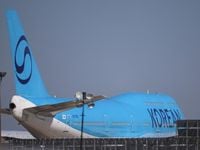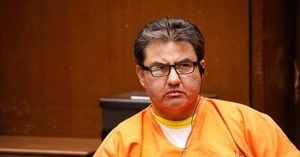Hundreds of South Korean workers are on their way home after a dramatic immigration raid at a Hyundai battery plant in Georgia, a move that’s sent shockwaves through diplomatic and business circles on both sides of the Pacific. The September 4 operation, carried out by U.S. Immigration and Customs Enforcement (ICE) agents, resulted in the arrest of more than 300 South Korean nationals, along with workers from China, Japan, and Indonesia. The episode, which included footage of workers in chains, has left many in South Korea feeling betrayed and bewildered, and has cast a long shadow over the future of Korean investment in the United States.
According to the Associated Press, the raid took place at a battery factory under construction at Hyundai’s sprawling auto plant west of Savannah, Georgia. ICE said the operation was the culmination of a months-long investigation into labor practices at the site, with workers arrested for alleged visa violations. Some had crossed the U.S. border illegally, while others entered legally but had expired visas or were working on waivers that prohibit employment.
By September 11, U.S. authorities released 330 detainees—316 of them South Koreans—who were bussed to Atlanta’s Hartsfield-Jackson airport to board a charter flight home, scheduled to arrive in South Korea on September 12. The group also included 10 Chinese nationals, three Japanese, and one Indonesian. Yet, the journey home was not without further drama. As reported by BBC and The Financial Times, the workers’ departure was delayed by more than a day on the instruction of President Donald Trump, who wanted to see if any would remain to help train American workers. In the end, only one South Korean opted to stay.
South Korean President Lee Jae Myung, marking his 100th day in office, didn’t mince words at a news conference on September 11. He warned that Korean companies would likely hesitate to make further investments in the U.S. unless Washington overhauls its visa system for skilled workers. "It’s not like these are long-term workers. When you build a factory or install equipment at a factory, you need technicians, but the United States doesn’t have that workforce and yet they won’t issue visas to let our people stay and do the work," Lee said, as quoted by the Associated Press. "If that’s not possible, then establishing a local factory in the United States will either come with severe disadvantages or become very difficult for our companies. They will wonder whether they should even do it."
Lee emphasized the "cultural differences" at play, noting, "In South Korea, we see Americans coming on tourist visas to teach English at private cram schools—they do it all the time, and we don’t think much of it, it’s just something you accept. But the United States clearly doesn’t see things that way." He described the raid as "bewildering" and suggested that the heavy-handed approach was at odds with the close relationship between the two countries.
The timing of the raid has only deepened the sense of shock in Seoul. It came less than two weeks after a summit between President Trump and President Lee, and just weeks after a July agreement in which South Korea pledged $350 billion in new U.S. investments—a commitment made against the backdrop of a struggling job market at home. Trump, for his part, has been vocal about the need for foreign companies to "LEGALLY bring your very smart people, with great technical talent," but has also insisted that these workers help train Americans. In a post on Truth Social, Trump stated, "But we do have to work something out where we bring in experts so that our people can be trained so that they can do it themselves."
South Korean officials have long expressed frustration that the U.S. has yet to create a visa system to accommodate skilled Korean workers, despite urging Seoul to expand its industrial investments in America. Korean companies have largely relied on short-term visitor visas or the Electronic System for Travel Authorization (ESTA) to send workers for launching and setting up manufacturing sites—a practice that had been tolerated for years. But as Lee pointed out, "Our people happened to be caught in one of those cases" of aggressive U.S. immigration enforcement.
The fallout from the raid has been swift and severe in South Korea. Lawmakers from both Lee’s Democratic Party and the conservative opposition condemned the detentions as heavy-handed and outrageous. South Korea’s largest newspaper compared the raid to a "rabbit hunt" by U.S. immigration authorities, and the Dong-A Ilbo warned it could have "a chilling effect on the activities of our businesses in the United States." The Yonhap News Agency called for both countries to "cooperate to repair cracks in their alliance."
Business leaders are also rattled. LG Energy Solution, which operates the plant with Hyundai, told the BBC that many of its employees had various types of visas or were under a visa waiver program. A worker at the site described panic and confusion during the raid, noting that most of those detained were mechanics installing production lines and were employed by contractors. Min Jeonghun, a professor at South Korea’s National Diplomatic Academy, observed that unless the U.S. updates its visa policies, "Korean companies will no longer be able to send their workers to the United States, causing inevitable delays in the expansion of facilities and other production activities, and the harm will boomerang back to the U.S. economy."
The stakes are high. South Korean companies are currently building more than 20 major industrial sites in the U.S., including other battery factories in Georgia and several other states, a semiconductor plant in Texas, and a shipbuilding project in Philadelphia. The two countries’ total trade volume reached $239.6 billion in 2024, according to U.S. trade data.
In response to the crisis, South Korea and the U.S. have agreed to establish a joint working group to discuss creating a new visa category to make it easier for Korean companies to send staff to American worksites. South Korean Foreign Minister Cho Hyun, after meeting with U.S. Secretary of State Marco Rubio, confirmed that U.S. officials have agreed to allow the workers detained in Georgia to return later to finish their work. Cho also warned that more Korean workers in the U.S. could be vulnerable to future crackdowns if the visa issue isn’t resolved.
The White House, meanwhile, has defended the immigration operation, dismissing concerns that it could deter foreign investment. President Trump reiterated his stance that foreign companies are welcome to bring in workers—so long as they respect U.S. immigration laws. "The U.S. government would make it 'quickly and legally possible' for foreign firms to bring workers into the country if they respected its immigration laws," Trump said, according to the BBC.
For now, the released workers are heading home, but the incident has left a bitter aftertaste and a host of unanswered questions. Will Korean companies continue to invest in the U.S. at the same scale? Can the two allies bridge their "cultural differences" on immigration and labor? As negotiations over new visa options get underway, the answers will shape not just the future of Korean investment in America, but also the broader dynamics of one of the world’s most important bilateral relationships.




